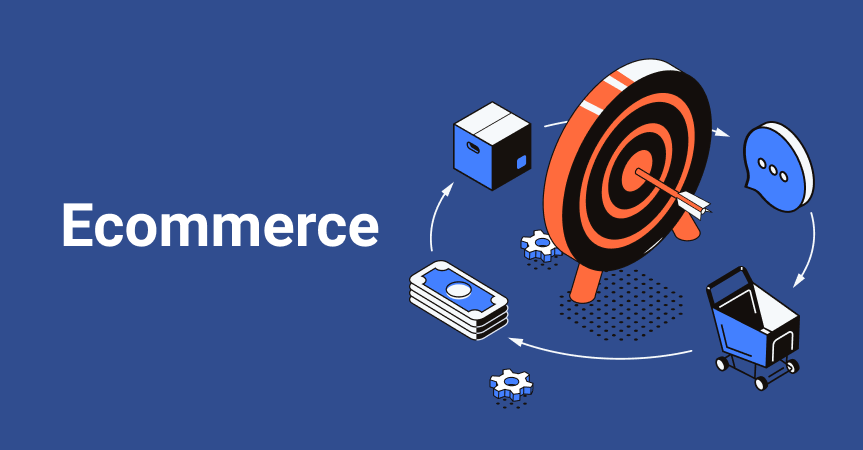Ecommerce

What is ecommerce?
Ecommerce, also known as electronic (or internet) commerce, is buying and selling goods or services on the internet, with online shopping being the most common and familiar example.
Which forms can it take?
Types of ecommerce by participants
- Business to business (B2B)
In this type of transaction, both the buyer and the seller are companies.
- Business to consumer (B2C)
This is the most common type of business model: here, a business sells goods or services to regular customers.
- Consumer to consumer (C2C)
In this case, a private individual simply resells their products to another regular buyer.
- Consumer to Business (C2B)
This ecommerce type means that a regular user sells something (which is not always a physical product itself) to a company or an organization.
Types of ecommerce by business model
- Dropshipping
- Wholesaling
- Private label
- White label
- Subscription-based model
How to start an ecommerce business?
There is a certain logical order in which you would go by in establishing an ecommerce business. This includes creating or purchasing a website for your online store, researching the product or service to sell, purchase and storage of goods depending on the type of product, analyzing the market and finding a target audience, as well as creating and launching various forms of promotional campaigns.
Finding a product to sell
Among the many steps involved in starting an ecommerce business, the first step is to find the products you are going to sell. Searching for a profitable product can take some time and require a lot of research, which is something you need to be prepared for.
Generally, the best products to sell are those that have the potential to bring you profit right now and allow you to scale your business in the future.
Once you’ve found the products you want to sell, you’ll need to find a trusted supplier with whom you will cooperate.
Researching your business and its growth potential
When you search for a product to sell, you will need to research certain aspects to create a successful business. The most notable aspects to research would be the competition, the pricing strategy, and the unique selling proposition.
Moreover, it is highly recommended to create a potential business plan that will help you understand where your business will grow, what opportunities lie in front of you, and the potential obstacles you might face.
Establishing a brand
Once you’ve figured out what and how you are going to sell, the next step to consider is establishing a brand. Here you need to think of the name of the store, your domain name, and your brand logo. Additionally, what can help to create your brand is learning the basics of SEO. Incorporating SEO elements into your business brand can help you get off to a good start. Moreover, you can attract more potential customers organically.
Creating an online store
The setup of your online store can be done in several ways. You either build it from scratch yourself, order a store development service or purchase a ready solution.
Luckily, there are a lot of services that can provide you with a quality online store in all these situations. Here are some of them: AliDropship, Shopify, BigCommerce.
What are the benefits of ecommerce?
With the internet becoming a regular part of everyday life, businesses have learned to take full advantage of it and adapt their strategies to utilize the internet for their benefit. The key advantages of ecommerce are:
Access to the global market
Unlike a physical store, an ecommerce store does not have geographical limitations. It means that, potentially, you can sell to anyone in the world.
Customer-friendly operation
An ecommerce store can be much easier to access than a brick-and-mortar one. Potential customers can visit it whenever they want and order what they like anytime.
Lower expenses
An ecommerce store does not require the same type of maintenance that a physical store requires. That means there is no need to hire any staff, pay for space, etc. In fact, if you choose to start a dropshipping business, you can even forget about the storage costs and aspects that are typical for a regular business.
Targeted marketing
Nowadays, with all the access to various internet data, it is extremely easy to find your designated target audience. The advertisements can be set up by potential customers’ interests, age, gender, place of living, income level, and many more. It allows a business to adjust its promotional campaigns according to various parameters and provide a better customer-oriented experience.
Niche markets availability
Providing products for a specific niche can be very challenging if you’re running a regular brick-and-mortar store. However, an ecommerce store allows you to tailor your product offering to a specific buyers’ segment and change it at any time without trouble or financial losses.
Flexible working environment
Generally, managing a regular store means you have to spend your time in an office. However, with an ecommerce business, all you need is a computer and an internet connection and you can work from anywhere you like. Of course, a lot depends on the type of your business. However, among all the ecommerce businesses, dropshipping is the most affordable and accessible one with a low entry threshold.






